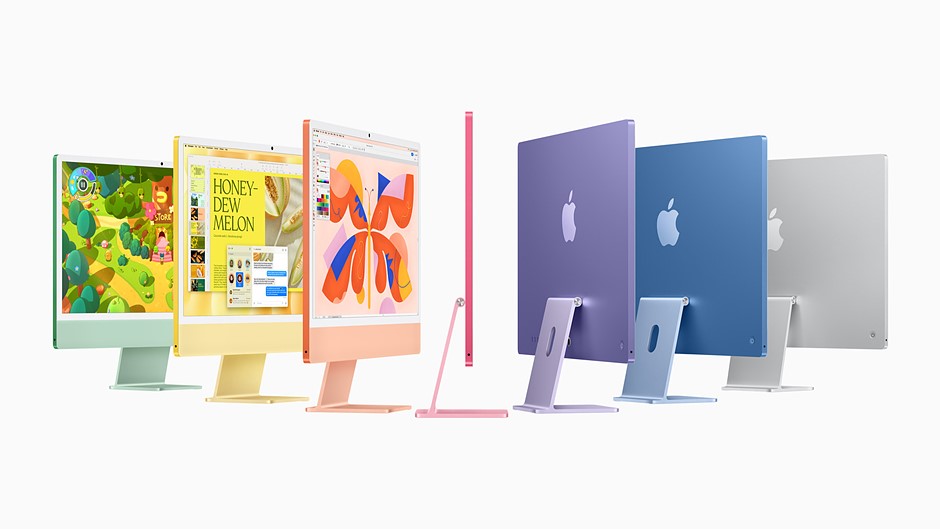
| Image: Apple |
Apple has announced a new iMac, which comes equipped with its latest M4 processor and 16GB of memory standard – double what the previous generation started with. The computer, which is a popular pick for creatives and photographers who don’t necessarily need the computer power or modularity of Apple’s higher-end models, is available in seven colors: blue, purple, pink, orange, yellow, green and silver.
Like before, Apple’s selling a base model that has two Thunderbolt ports, and a less powerful processor. The two-port model has an M4 chip with 4 performance CPU cores and 4 efficiency CPU cores, along with an 8 core GPU. The upgraded four-port models add two efficiency and GPU cores. They also max out at 2TB of storage instead of 1, and 32GB RAM instead of 24.
Apple opted to release a video presentation for the iMac, instead of just doing a press release – though it does spend the first four minutes rehashing its AI features.
Those four ports are all full Thunderbolt 4 now; the previous-gen four-port iMac had two Thunderbolt ports and two USB 3 ports, which were substantially slower.
The built-in 24″ display appears to be unchanged from the previous model. It’s still a 4.5K ‘Retina’ panel with a max brightness of 500 nits and support for P3 color. However, there’s good news for fans of external displays: the four-port models with 10-core GPUs can drive up to two 6K/60Hz displays alongside the built-in screen or a single 8K display at 120Hz. The previous-generation iMac only supported one external display, though that’s unfortunately also true for the new two-port iMac as well.
 |
|
Four full-speed ports is good if you want to use a bunch of displays. Like with previous models, the four-port iMac also includes a gigabit ethernet port built into the power brick. Image: Apple |
Another downside for the two-port model is that you can’t add the ‘Nano-texture’ display option like you can with the higher-end models. Apple says the $200 add-on, which wasn’t available on the previous M3 iMac, will “reduce reflectivity and glare while maintaining outstanding image quality.” Essentially, it’s a matte display option for those whose computers are often in direct sunlight.
The new iMac also has some other small upgrades. The 1080p webcam now supports Apple’s ‘Center Stage’ and ‘Desk View’ features that work to keep you in the frame and show off what’s on the desk in front of the computer, respectively. The included color-matched peripherals now use the near-universal USB-C to charge instead of the old Lightning; the keyboard included with the four-port model includes a Touch ID sensor, which is missing on the keyboard that comes with the two-port model.
Overall, the new iMacs should continue the tradition of being decent all-in-ones for photo editing, light video work and general use, especially now that they’re no longer blighted by a woefully inadequate 8GB of RAM – a change Apple will hopefully bring that change to the rest of its lineup too. The base storage, however, is still stuck at 256GB, and Apple still charges a pretty penny for its bigger SSDs.
It’s also nice to see that Apple hasn’t raised the base price of the iMac in the US: the base model still starts at $1,299. However, it’s arguable that most people should spend the $200 upgrade to the four-port model, as you get a lot of bang for your buck. If you go with the base model, though, you’ll be glad to hear that Apple’s now selling it in all seven colors, while the previous base iMacs only came in a limited selection.
The new iMacs are available for pre-order now, and will start hitting store shelves on November 8th.





